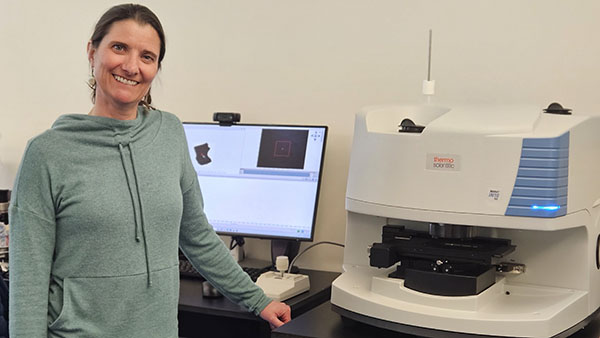Home / News / 2023-2024 News / Central Wyoming College Revolutionizes STEM Education with Cutting-Edge Equipment and Innovative Research
Central Wyoming College Revolutionizes STEM Education with Cutting-Edge Equipment and Innovative Research
Home / News / 2023-2024 News / Central Wyoming College Revolutionizes STEM Education with Cutting-Edge Equipment and Innovative Research
Central Wyoming College Revolutionizes STEM Education with Cutting-Edge Equipment and Innovative Research

Jackson, Wyo. – Central Wyoming College proudly announces a significant advancement in its STEM (Science, Technology, Engineering, and Mathematics) program with the acquisition of state-of-the-art scientific equipment that will be housed at the College’s Jackson campus.
These additions, the Nanodrop spectrophotometer and Fourier Transform Infrared Spectroscopy (FTIR) machine, offer opportunities for research and education.
“Our investment in this equipment reflects the college’s commitment to fostering STEM innovation and excellence,” says Kirsten Kapp, Professor of Biology and Mathematics at Central Wyoming College’s Jackson campus. “These tools empower students to conduct groundbreaking research and gain valuable scientific insights.”
Kapp, who will be overseeing the use of these instruments in the classroom, is renowned for her research on microplastic pollution. Her scholarly publications and academic excellence set a high standard for education and research at CWC.
Her contributions to the scientific community have been supported by grants from the Wyoming NASA Space Grant Consortium, Wyoming INBRE through an Institutional Development Award (IDeA) from the National Institute of General Medical Sciences of the National Institutes of Health and by the Teton Conservation District.
Their integration into Central Wyoming College’s STEM education represents a significant advancement, empowering students and researchers to make groundbreaking discoveries across diverse fields.
“Our investment in cutting-edge equipment reflects our commitment to fostering STEM innovation and excellence,” says CWC President Brad Tyndall. “These tools empower students to conduct groundbreaking research and gain valuable scientific insights.”
The Nanodrop spectrophotometer, a device commonly used in molecular biology and biochemistry labs, precisely measures nucleic acid and protein sample concentration and purity. With high-resolution spectrophotometry, researchers can precisely determine DNA, RNA, or protein concentrations in samples, revolutionizing genetics and biochemistry studies. Its ability to analyze small sample volumes is invaluable for examining limited or precious samples.
Integrating this instrument into classroom activities familiarizes biology students with common bioinformatics tools, enhancing their laboratory skills and understanding for future educational and career endeavors.
The Nanodrop is complemented by a Fourier Transform Infrared imaging microscope (or FTIR), which collects high-resolution spectral data from Near Infrared (NIR) to Far Infrared (FIR).
Widely utilized in industries for quality control and research, the FTIR equipped with a slide-on microtip geranium ATR (Attenuated Total Reflectance) crystal allows for precise analysis of particles down to 5 microns. Its applications span fields such as pharmaceuticals, environmental science, and materials science.
In classrooms, it offers hands-on experience in molecular spectroscopy and chemical analysis, enhancing students’ practical laboratory skills and understanding of its applications in research and industry.
“We’re excited to have Professor Kapp leading our STEM program and to have these state-of-the-art scientific instruments, which will greatly enhance research opportunities for our students,” President Tyndall says.
Beth Monteiro, Executive Director for CWC Foundation, led the acquisition of the equipment, enhancing academic programs and research initiatives. With a proven track record in advocacy and strategic partnerships, Monteiro’s efforts underscore CWC’s commitment to advancing STEM education.
These invaluable assets were made possible through a generous grant from the Department of Energy.
Central Wyoming College’s STEM program offers a diverse range of degree and certificate programs, providing students with a solid foundation in biological sciences, chemistry, physics, and related fields.
Graduates of CWC’s STEM program are well-equipped to pursue careers in fields such as medicine, environmental science and more.
For more information about Central Wyoming College’s STEM program, visit our website at (https://www.cwc.edu/programs/science-tech-engineering-math/).
2660 Peck Avenue
Riverton, WY 82501
(307) 855 – 2000
Campus Map
120 Enterprise Blvd.
Lander, WY 82520
(307) 332 – 3394
Campus Map
240 S. Glenwood St #124
P.O. Box 4795
Jackson, WY 83001
(307) 733 – 7425
Campus Map
302 W. Ramshorn
P.O. Box 175
Dubois, WY 82513
(307) 455 – 2625
Campus Map
© 2024 Central Wyoming College – All Rights Reserved